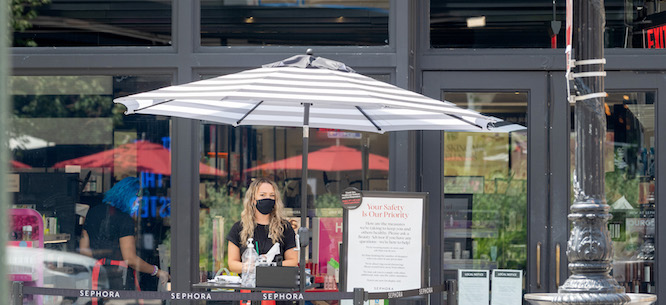“I’m Not Going to Risk My Life for Lipstick”
“I’m Not Going to Risk My Life for Lipstick”
Sephora workers are weighing their growing economic insecurity against the health risks of returning.

We are living through a profound social and economic shock, but if past is prologue, our desire to look good might be immune to the pandemic. During the Great Depression, consumers exhibited the so-called “Lipstick Effect”: a striking rise in people’s cosmetics purchases despite the rest of the economy crumbling around them. Today the reopening of cosmetics retailers in the midst of a pandemic might bring an even more cathartic wave of impulse shopping. But it may cost some workers their health.
The luxury cosmetics retailer Sephora, whose reopening plans Dissent reported on in May, has reopened 99 percent of its retail outlets nationwide after closing at the outset of the pandemic. One Sephora worker, giving an update on their previous interview with Dissent, would rather sit out the company’s relaunch—not only because they have a health condition that would make them especially vulnerable to the virus, but also because of the practicalities of how their workplace is set up. Although stores are operating under new guidelines including social distancing, sanitizing, and mask-wearing, the worker said that the “backstage” employee space, separate from the retail floor, is where infections could proliferate. While social distancing among customers might be feasible, they said, “backstage, there’s absolutely no way to do that. It’s just this mess of tiny little hallways. You can be six feet from someone, but there’s no way for someone to pass in the hallway until everyone just clears out, it’s impossible. The bathrooms are stall bathrooms, and the employee kitchen is a seven-foot-wide corridor with a counter on it. There’s no way to keep safe.”
Sephora workers are having to weigh their growing economic insecurity against the health risks of returning. Like many other large retailers, Sephora has slashed its workforce, laying off about one-fifth of its employees in the first two months of the crisis, including about 30 percent of total staff at its stores. (The company says it offered severance and hopes that “we will be able to rehire these individuals in the future,” but offered no indication of when that might happen.) For those who survived the cuts, the company offered full pay up until the stores reopened. Now, many workers at the reopened stores will have to rely on up to two weeks of unpaid time off if they want to stay home for “non-medical reasons.” Beyond that, they can apply for the Family and Medical Leave Act (FMLA), a federal law that offers some employees an extended period of unpaid leave during which they are guaranteed not to be terminated. But the worker said that based on the way store employees’ hours are calculated under federal guidelines, they likely would not qualify for FMLA, because the past three months of closures would leave them without the requisite number of hours.
In addition, the worker said there was pressure to return to work once stores began reopening, despite residual health concerns: “A lot of people . . . were being told that we’re forfeiting our jobs—that it’s a voluntary resignation—if we don’t show up by such and such date.”
Sephora is ready to reopen even if some workers aren’t. The company stated in an email to Dissent that it was enforcing a social distancing policy by “limiting the number of shoppers who can enter at any given time,” with “floor markers and plexiglass barriers at checkout to help clients and employees remain six feet apart.” The stores are also thoroughly cleaned and disinfected regularly, and require all employees as well as shoppers to wear masks.
The worker noted that employees are provided cloth masks, but not medical-grade N95 respirators. Sephora says it is complying with Centers for Disease Control guidelines by only requiring cloth masks, because medical-grade masks “should be reserved for healthcare workers or first responders.”
The worker suspects a less altruistic reason why the management prefers cloth masks. “They denied individuals the right to wear medical-grade PPE [personal protective equipment],” they said, “because it is not inviting to the customers, it’s scary to the customers.”
But the worker has not given up hope of returning eventually to Sephora. “I’m trying to stay in the company . . . because they’ve been a good employer up until this,” they said. “This is a pretty major faux pas, and I think that corporate [is] really not looking out for the best interests of employees [or] the safety of their customers. No one should be reopening a store right now.”
Originally, the worker recalled, returning to work seemed feasible despite their health concerns, “as long as I could wear my medical-grade PPE. But when it came down to it, I had an anxiety attack, and I can’t. . . . I’m not going to risk my life for lipstick.”
Michelle Chen is a member of Dissent’s editorial board and co-host of its Belabored podcast.






